And the Bandwidth Plays On…Reconfiguring the Internet on the Titanic
Almost all historians agree on the following fact: Internet access on the Titanic was terrible. Really, it was just horrible.
It was nearly impossible to get a wireless signal, the connection speed was atrocious, the router always had to be re-set, it was unreasonably expensive, and that’s without even bringing up the fact that most of the passengers were confounded if one asked for their help with connecting to the Internet. When the ship started sinking there were a few individuals who were confident that the problem was not actually the hole in the side of the ship, it was that the Internet was so terrible, and thus they frantically tried to get the attention of those fleeing for the lifeboats to insist that something had to be done about the Internet. Granted, the Internet connection on the Titanic was really bad, and that is an understatement. Indeed, had the Titanic just sailed along its merry way (without incident) one can easily imagine the folks (not the ones in steerage of course) discussing how serious this “Internet issue” was, and how action had to be taken to fix the Internet post haste.
But the Titanic had other issues. Pretty big ones actually. And while the Internet might have been related to some of those other issues, to scream on the deck of the Titanic: “The Internet is doomed!” would have been to invite the reply “You realize that there’s a hole in the side of the ship, right?”
Ruptures in society occur when people can no longer go about casually ignoring an issue; when the ship that is casually sailing along hits an iceberg and suddenly all of the tensions and issues are made all too clear. Generally, the source of anger and frustration is not the result of a genuinely new thing, but is instead related to a wider swath of the population being forced to acknowledge that there is an issue. Case in point: surveillance, which had been an issue that numerous groups had been raising alarms about (and from which many sections of the population had been feeling the oppressive weight) but which suddenly became a much bigger issue when everybody was forced to recognize that they too were being watched. And to make matters worse, being watched through the very devices upon which they had become so dependent. To continue with the Titanic analogy and apply it to surveillance: the iceberg of Snowden’s revelations made it clear that every room on the ship was bugged and fitted with cameras and the “tickets” were tracking passenger’s every movement.
On a similar note the recent lustful amorous flirtations between Comcast and Time Warner Cable, along with Netflix agreeing to pay Comcast for preferential treatment, and Verizon beating the FCC in court in a win largely seen as a blow to Net Neutrality have brought about a fresh rupture in which people are forced to gaze at the Internet in shock and horror. Declaring in outrage and indignation that “The Internet is Fucked” (as Nilay Patel put it in an article of the same title at the tech site The Verge), and that its glorious potential has been damaged by the combination of centralization and lax oversight such that in the US people pay a lot for Internet access, have few options, and in the end get service that is demonstrably worse than what is enjoyed in other parts of the world. As a remedy some (such as Patel) suggest that the solution is to consider the Internet as a utility (akin to Water and Electricity) and to force the FCC to discover its backbone and actually do some regulating.
Of course, these arguments about the Internet – and their solutions as well – are not new. Though the triumvirate of situations previously mentioned have suddenly made it so that people feel as though this is an issue they need to care about now (immediately!). Indeed, the bulk of the argument Patel develops in his article for The Verge (with it’s catchy and profane title) appears in Robert McChesney’s recent book Digital Disconnect: How Capitalism is Turning the Internet Against Democracy (which may not be a total coincidence as Patel’s piece involves discussions with several people from Free Press [with which McChesney is affiliated]). It may be that a key difference between McChesney’s book and Patel’s article (besides length) is not simply the exact moment at which they arose, but the nature of the overall critique.
After all, whereas Patel’s article is filled with righteous anger it is ultimately an article that looks lovingly upon capitalism, the Internet, and technology firms like Apple and Google; while McChesney’s account is located in a stronger (rather Marxist) critique of political economy that sees the issues of the Internet and technology as inextricably linked to issues of power and control in society. Which is another way of saying: Patel’s article is bemoaning the state of the Internet on the sinking Titanic, McChesney’s book (and similar works) point out that the Internet is one aspect of the problem – but fixing the Internet on a sinking ship is not in and of itself going to stop the ship from sinking.
Some of this tension comes across clearly in considerations of the “Internet as a utility.” Frankly, this is a compelling argument. One that recognizes that in modern highly technological societies Internet access has become deeply intertwined with the daily lives of much of the population. To treat the Internet as a utility is to foreground its importance in people’s lives and to sweep away many of the definitional issues that get in the way of its centrality to modern life being fully appreciated. Yet, one invites problems when comparing it with other utilities like water and electricity. After all, the Internet is related (maybe they’re second cousins) to electricity: without electricity your modem and router do not work, without electricity you cannot charge your smartphone or computer. Before you reach the Internet utility, in other words, you need to have secured the Electric utility.
Water; however, proves a more interesting case. After all, at risk of being simplistic, humans need water to survive, they do not need the Internet. No, really. This is not to say that the Internet is unimportant, and some people have certainly wailed “I cannot survive without the Internet” but in order to shout those words to the sky they first have to be hydrated. A community can survive without the Internet (as demonstrated by most of human history), but without access to water? Was the importance of water not just demonstrated in West Virginia after the recent chemical spill?
Indeed, it is in thinking about the example of the water situation in West Virginia that we are able to gain some of the distance from which we can see the problematic holes in the argument about the “Internet is a utility.” Namely: how are the utilities in the US doing these days? Answer: not so good. And just as the organization tasked with regulating the Internet (the FCC) has been continually stymied, so too have the groups that are meant to regulate and protect other aspects of the national infrastructure (such as FEMA and theEPA). Though these stories do not often garner too much attention unless a bridge collapses or a town’s water is contaminated, at this point it is reasonably clear that (in the US) the infrastructure, which delivers those utilities, is old, decaying, and getting steadily worse. We have an aging electric grid and systems of delivering water that are prone to contamination (from West Virginia to fracking leading to flammable faucets). To suggest that the Internet needs to be seen as a utility should immediately result in the response: “fine, but have you seen the state of utilities in this country?” Which is also a reminder that for many people those important utilities – and necessary for survival – are not cheap or reliable (consider that much of the debt that has crippled Detroit is linked to Water systems). The danger, to return to the Titanic, is thus that declaring the Internet a utility is all well and good for those on the upper decks who do not need to worry about clean water and electricity, but for many people the picture of “utilities” is already problematic.
The neoliberal corporatizing assault that has plundered public utilities (resulting in tons of public debt) is kin with the centralizing of power we are seeing taking place with the Internet. Alas, the state of the Internet is already a tale of privatization insofar as the Internet was created through governmentally funded (i.e. your tax dollars) research, and makes use of publicly owned spectrum – the sorry state of the Internet is part of the same pursuit of profit from publicly owned entities. Declaring something a “utility” t does not mean banks and corporations will not figure out how to “utilize” it for profit. Centralization, control, deregulation, immense profits flowing in one direction in exchange for lackluster goods – these are not issues that are somehow unique to the Internet. It is just that the state of the rest of the economy is now disrupting the techno-utopian fantasies the Internet’s high priests. These are the very same techno-evangelists who are at the forefront of what Lewis Mumford, the philosopher and historian of technology, warned of thusly:
“We overvalue the technical instrument: the machine has become our main source of magic, and it has given us a false sense of possessing godlike powers. An age that has devaluated all its symbols has turned the machine itself into a universal symbol: a god to be worshiped.” (Mumford, 138 – Art and Technics)
If you are part of the technologically connected class in the US living in an enclave of relative wealth it’s easy to declare ”The Internet is Fucked” but much of the population would be justified in countering this with “Okay, sure, but actually, everything is.” It is in some ways easy to draw a parallel between this chorus crying “the Internet is the issue” and recent anger around private tech-worker buses in parts of California. Namely that the issues of the tech world, and the issues pointed to by the tech world, may be real issues (employees do need to get to work and mass transit is better for the environment) but insofar as these tech specific issues fail to recognize that technological systems are deeply interwoven with a society the ultimate result is that they pose well-meaning if laughably flawed solutions. The situation is one that Lewis Mumford, decried in strikingly blunt terms:
“Let no one imagine that there is a mechanical cure for this mechanical disease.” (Mumford, 50 – In the Name of Sanity)
To praise Google, Apple and their ilk (as Patel does) while hoping for a more rigorous regulatory regime is rather comical – after all, tech executives are given to the type of cyber-libertarian dreaming of “regulatory free” zones. If such companies were to back the FCC having more regulatory power it should be obvious the move would be a means to gain temporary power over a rival, after which point they would turn around to demand the dismantling of such regulation. Would the tech firms that are frantically buying up would-be competitors (from Facebook to Google to Yahoo) really want to see a regulatory office with teeth and a hunger for breaking up monopolies? Doubtful.
It may well be that what the recent concerns about the state of the Internet and the calls for the FCC (i.e. the government) to do something represent are a sudden recognition that perhaps the issues of the tech world are – get ready to gasp – actually political issues (gasp) which might very well demand political solutions (gasp). Such was recently on display in the “Day We Fight Back” against mass surveillance – though that movement as with the “Internet is a utility” move share a central flaw: today, political power and economic power are so closely intertwined as to be nearly indistinguishable. Political problems are also economic ones. After all, to note suddenly that the Internet is political is to arrive tragically late to the recognition that machines have and represent political decisions and power relations. Again, this is not a new point, and was expressed years before the “Internet revolution” by the philosopher of technology Langdon Winner:
“let us recognize that every technology of significance to us implies a set of political commitments that can be identified if one looks carefully enough. What appear to be merely instrumental choices are better seen as choices about the form of social and political life a society builds, choices about the kinds of people we want to become.” (Winner, 52)
What ruptures such as the Comcast/Time Warner Cable deal cause is that people no longer need to look “carefully,” instead it becomes rather obvious. To arrive at this understanding is important, and to arrive at it late is not in and of itself a problem. The risk is to suddenly consider the concerns to be socio-political without recognizing that the issues have always been socio-political.
Here we arrive at what is perhaps the key problem in a consideration of the politics of the Internet – that the Internet actually represents not a single technology (“The Internet”) but a multitude of interlinked technological systems: from server farms to modems to routers to laptops to tablets to smartphones to cable to ISPs to telecoms and the list could go on. In many ways the Internet is a perfect example of the split between what Lewis Mumford termed “Authoritarian and Democratic Technics.” By “Democratic Technics” Mumford had in mind small scale, locally created and locally controlled technologies while “Authoritarian Technics” were meant to stand in for larger systems that imposed a centralized socio-political will on people (Mumford sometimes called this “The Megamachine” while Jacques Ellul came to similar conclusions with what he called “Technique”). In modern times the praise of the Internet as a “democratic” space makes many want to view it as a “Democratic Technic” and while such is an argument could certainly be advanced the problem is that it is a “Democratic Technic” (“The Internet”) that can only be reached through a whole range of “Authoritarian Technics” (major tech companies) – thus there is a late appeal to traditional democratic structures (the government) which comes about after those very structures have already been knee-capped by the political might of dominant technologies. The Internet may be a land of “open” and “liberating” potential — but if to reach this place one must take a heavily controlled toll-road this will ultimately effect the destination. Or, to quote Langdon Winner again, what we see is that:
“the prevailing consensus seems to be that people love a life of high consumption, tremble at the thought that it might end, and are displeased about having to clean up the messes that modern technologies sometimes bring.” (Winner, 51)
It is an effort to fix the Internet connection on the Titanic whilst ignoring that the problem is not download speed but that the ship which was always defined by a range of social/political/economic issues is now having to confront those issues after crashing into the iceberg made massive by contemporary power systems (economic, social and political).
The intention is not to delight in doom-saying or to put forth a comical suggestion like “go live in a cave” (though many try to portray all technological critique as such a suggestion) but to highlight the fact that the technological problems of our day are not just technological problems requiring technological solutions so that a certain subset of the population can go back to playing in the technological pleasure garden with a faster connection speed. The centralized control of the Internet is less about the Internet than it is about tendencies in our political and economic life that have enhanced and been enhanced by the power of contemporary technologies. What is needed is not to angrily declare “The Internet is Fucked” and demand solutions that provide a façade of change while leaving the underlying relations unchanged, what is needed is to recognize that to right this sinking ship requires addressing the issue of the entire ship – from its economic stratification, to its regimes of control, to the fact that demanding a new utility while ignoring the state of the old utilities makes a mockery of utilitarian logic. To return to Mumford – who along with thinkers like Jacques Ellul warned Cassandra like against our current state of affairs:
“no part of our technics is self-sustaining, and no part is unaffected by decisions we make in other departments of our culture—decisions of a moral, esthetic, religious, or political nature. Our situation today calls for a development of the repressed and dwarfed functions of the human personality, on a sufficient scale to restore the ecological balance that technics has disrupted. Unlimited profit and unlimited power can no longer be the determining elements in techics, if our civilization as a whole is to be saved: social and personal development must take precedence.” (Mumford, 59/60 – In the Name of Sanity)
What the above quote hopefully suggests is that it is not that “The Internet is Fucked,” it is that our priorities are. If we fail to recognize this we are left desperately trying to reconfigure the Internet connection on the Titanic. As the ship slowly sinks with us on it.
Related Content
“More than Machinery, We Need Humanity”
Luddism for these Ludicrous Times
Works Cited
Mumford, Lewis. In the Name of Sanity. Harcourt, Brace and Company – 1954.
Mumford, Lewis. Art and Technics. Columbia University Press – 2000.
Winner, Langdon. The Whale and the Reactor. Chicago University Press, 1989.


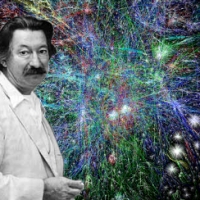
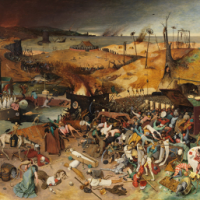



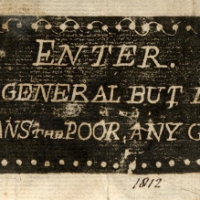
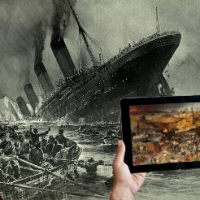

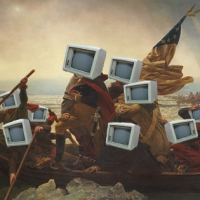

Pingback: Human Rights and Technological Wrongs | LibrarianShipwreck
Pingback: It’s a Bird! It’s a Plane! No…It’s a Facebook Drone. | LibrarianShipwreck
Pingback: Fighting Fire with Arsonists | LibrarianShipwreck
Pingback: This “Open Future” is Brought to You By… | LibrarianShipwreck
Pingback: Oh, What the Zuck!? | LibrarianShipwreck
Pingback: Riddled With Questions: Interrogating Your Technology | LibrarianShipwreck
Pingback: A Virtual Reality or A Virtuous Reality? – Facebook buys Oculus | LibrarianShipwreck
Pingback: The Hearbreak of Heartbleed | LibrarianShipwreck
Pingback: Whose Vision of the Future is This? | LibrarianShipwreck
Pingback: Disrupt Everything! (as long as it’s profitable) | LibrarianShipwreck
Pingback: You Can’t Spell Betrayal Without FCC | LibrarianShipwreck
Pingback: A Pyramid of Technological Society | LibrarianShipwreck
Pingback: “We Still Carry On Thinking…” | LibrarianShipwreck
Pingback: The Faucet Goes Dry in Detroit | LibrarianShipwreck
Pingback: Bogus, but not the Bogeyman – The FCC and Net Neutrality | LibrarianShipwreck
Pingback: Speeding Towards a Slowdown | LibrarianShipwreck